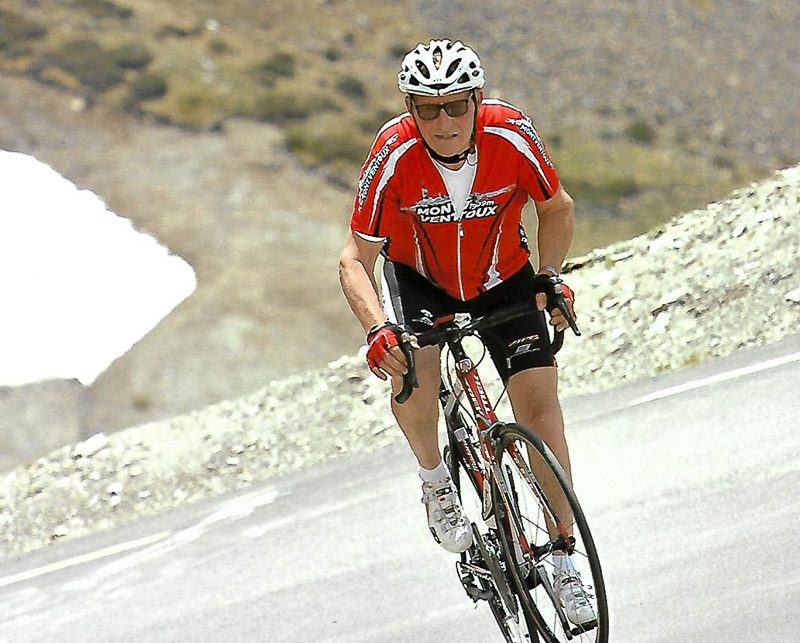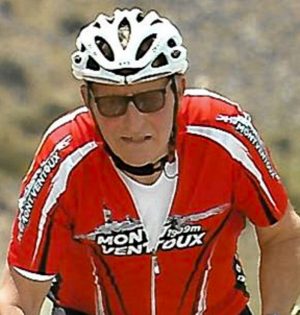
‘When I were a lad’ next to the Milk Race the biggest deal in UK cycling was the BBAR (Best British All Rounder) to find Britain’s best ‘tester’ – over 50 and 100 miles plus the 12 hour.
The competition still exists but do you know who the BBAR is?
Me neither.
But back in 1970 when I first got into cycling I could have told you who was leading the competition from when the first 12 hours were ridden in midsummer right through to the end of the year and the crucial last, fast ‘50’ on the fast Boroughbridge course at the end of September.
To win the BBAR was a big deal and would ensure cover pictures in Cycling Weekly and multiple page interviews in the same magazine.
In the 60’s it was an even bigger deal with the year end prize presentation and concert held in a packed Albert Hall.
Yorkshire’s Peter Hill won the BBAR twice but instead of going for his ‘hat trick’ he completely changed direction and headed across the English Channel – a far more daunting prospect back then – to France and established himself as one of the world’s leading amateur time trial exponents, beating men like Tour de France winners Luis Ocana and Bernard Thevenet along the way.
He turned professional with Peugeot but in those Machiavellian days and as was the case with so many ‘Anglos’ in that era, it didn’t work out.
Here’s his story…
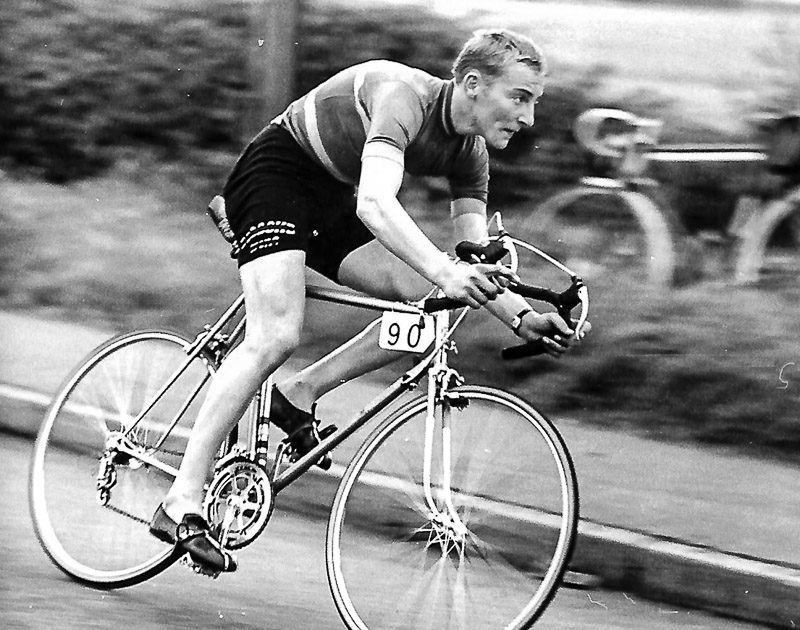
Tell us how you started out in cycling, please Peter.
“When I was a youngster I used to participate in all kind of sports which I practised with pleasure and success.
“My first ambition as to be a professional football player and I also played for the Doncaster boys soccer team.
“At 15 when I left school I started to work at the colliery office and I decided to buy a racing bike with my first wages as some of my friends gave me the idea to start cycling. I started riding for the pleasure and at the same time I joined the Askern Cycling Club, which did cycle touring and racing.
“I began racing in 1962 and won my first first event – on fixed wheel – and continued riding, but always just for the pleasure. That same year I spent two weeks touring in Norway, at beginning of September. Upon returning home I rode a 12 hours TT on a fixed wheel, recording 248 miles.
“The next season, 1963 I decided to buy a new bike. Unhappily a car driver ran into me and broke my bike during an event, so my father bought me a second hand road bike. From then onwards I started to do really good times trials – this bike had a 54 X 13 top gear!
“I always rode for the pleasure with the only ambition to beat my personal best time – but I won the BBAR in my first attempt.”
Two BBAR wins, the first of the ‘big gear men’ – what are your memories?
“I was proud to be only the third rider to go under the four hours for a 100 miles TT and also to win the 100 miles British TT championship and prove I was the best 100 mile rider in the country .
“My biggest memory is when I went to London for the first time, especially to Albert Hall for the BBAR presentation, with my parents who had never been there before. It was a great honour and it remains a great memory.
“My second BBAR title in 1964 was proof that the first title was not by chance.
“Also in 1964, I got my first selection with the British road team to ride the Tour of Holland which was a good experience for future road races.”
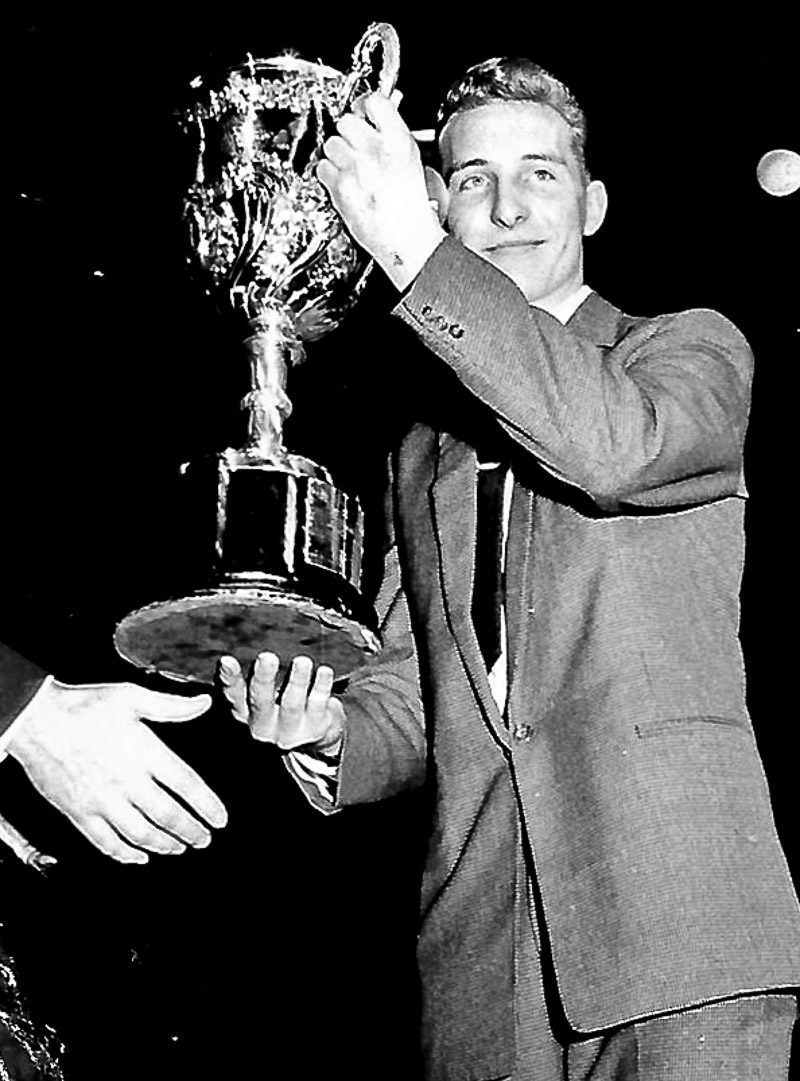
When you headed for France you had little in the way of road palmarès – why go and how did you organise it?
“I thought I had nothing more to prove in England and as I was such a fan of Jacques Anquetil I managed to arrange to go to his club ‘Auto Cycle Sottevillais.’
“I met David Cooper who had contacts with journalists and managed to get in touch with the club’s mentor and trainer, André Boucher in Sotteville.”
(Boucher was Jacques Anquetil’s trainer, coaching the Norman rider to nine GP des Nations wins and famed and feared for his uncompromising Derny training sessions, ed.)
Where was ‘home’ en France – what was getting settled in like?
“An article in Paris Normandie paper in October 1964 was asking for a ‘sporting family’ who would wish to host a British cyclist.
“Monsieur Boucher knew a very serious family in Normandie; their son went to train with the Sotteville Club.
“I arrived in France for the first time in my life on 22nd February 1965 with Jock Wadley the famous cycling journalist, who wanted to do a cover picture and article about me for his Sporting Cyclist magazine.
“The four first months were hard and difficult. It was not the same style of life, not the same living environment, not the same meal times, not the same food and I only knew two or three French words.
“But after my first wins I got more confident, used to this French way of life and my French improved after six months.
“The family’s son where I lived was the same age as me and help me very much with the language.”
How did you connect with Monsieur Boucher – what was he like?
“At the beginning It was not so easy to speak with him, he didn’t speak English and I didn’t speak French – but we managed. He was very serious and rigorous and all the club had absolutely to respect him and his instructions – I still keep his strict recommendations on a paper which he gave me the first day I met him with the good and bad things to do and not to do.
“He really was a perfect trainer with special written training programmes for major events.
“Everything went very well while I was amateur in the Club – but he was not so encouraging when I decided to turn pro.”
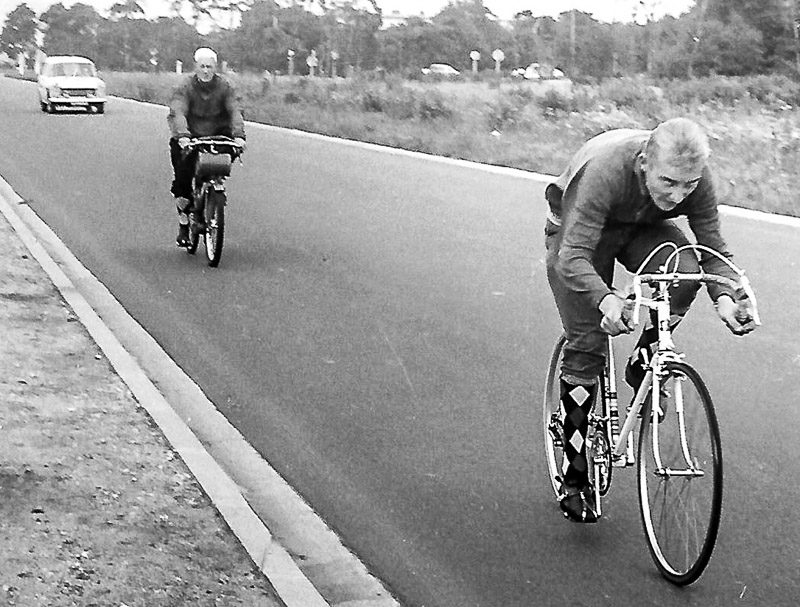
1965, you were second to Jean Dumont (Dumont won the race twice as well as the French Amateur Road Championships and a Tour de France stage, ed.) in The GP des Nations (75 K) and won the GP des France (77k) with Luis Ocana second; you also won the Pont – Audemer Chrono (86.6 K) – very strong results, how did you prepare for and what are your memories of those races?
“For each big event Mr Boucher programmed specialist training starting three weeks before the targeted race – including riding hard behind the Derny three times each week. Race rehearsal over the parcours was done three days before – on Thursday afternoon usually.
“The Grand Prix de France in Laval was the race which I really wanted to win to prove I was a good time triallist.
“It remains a great memory for me.”
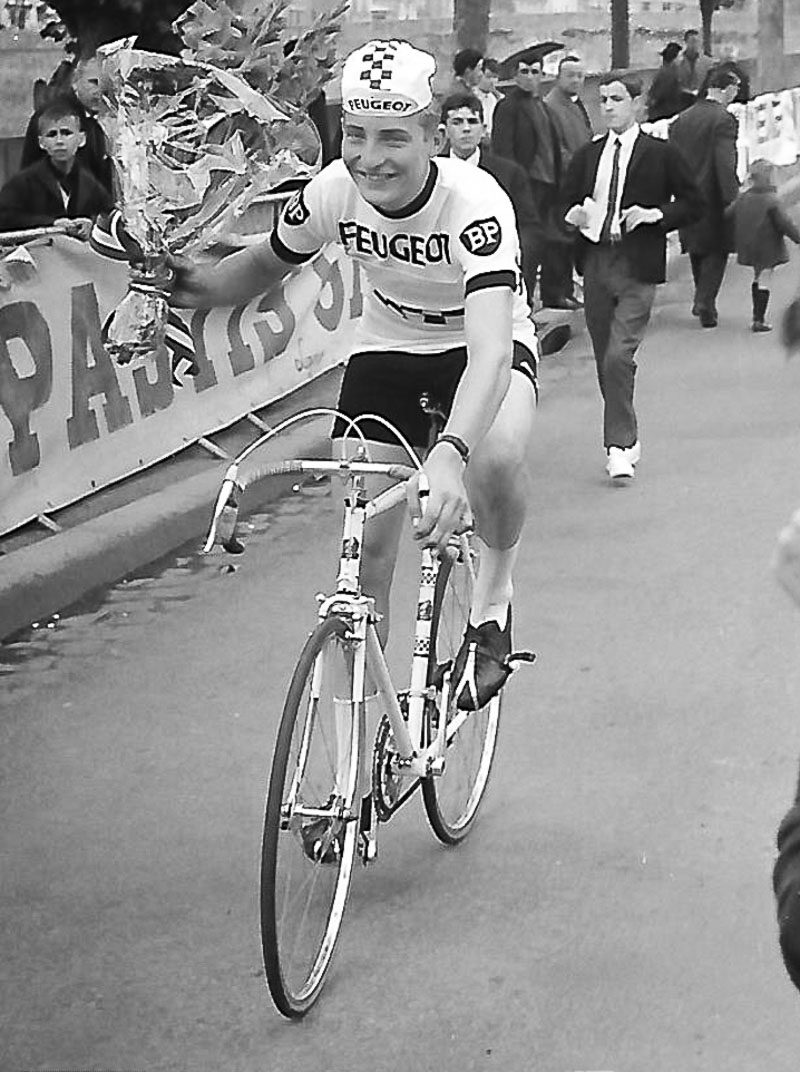
Then in 1966 you were second in The Nations (75 K) behind Jean Sadot (who turned pro for Peugeot for season ’67, ed.) with Bernard Thevenet third – you must have been disappointed not to win?
“Yes, I was disappointed I was unable to win, but it was a mistake between Mr Boucher and me as he recommended not to ride a big gear at the beginning of the day.
“I didn’t agree with this recommendation but I had to follow his decisions – I finished second by 18 seconds.”
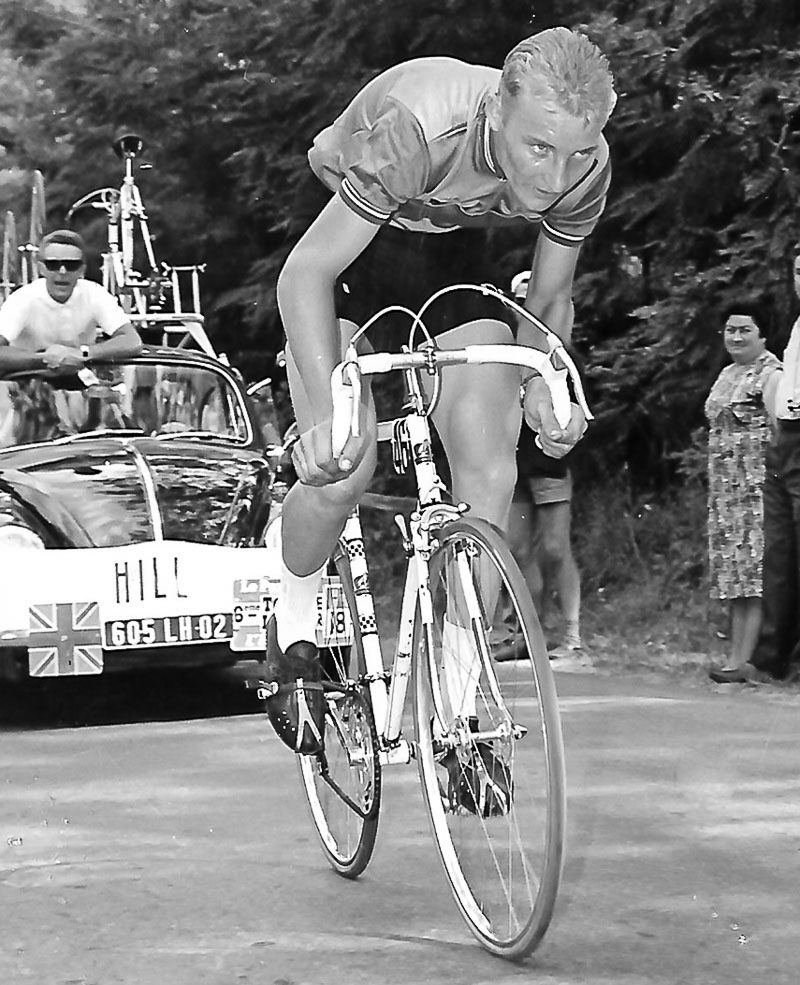
What were your ‘massed start’ results like in France?
“I had a lot of success in amateur bunched races in Normandie, up against a lot of good and experienced riders in that arena.”
How did the professional contract with the Peugeot team come about?
“Mr Boucher arranged the contract with Peugeot in Paris – I already had a contract with them as an amateur.”
What was it like being an Englishman on a French team?
“One felt an outsider as an Englishman in a French team at that time. The contact with my team mates wasn’t warm and my English ways were not understood and maybe not appreciated.
“I realise now it was ‘every man for himself’ and sometimes we have to be more of a hypocrite than we’d like in those circumstances.”
What are your memories of your Peugeot team mate, Tom Simpson?
“I have good memories of Tom as a great champion but unfortunately I never had opportunity to know him better as he lived in Belgium so we didn’t come in to contact with each other so much.”
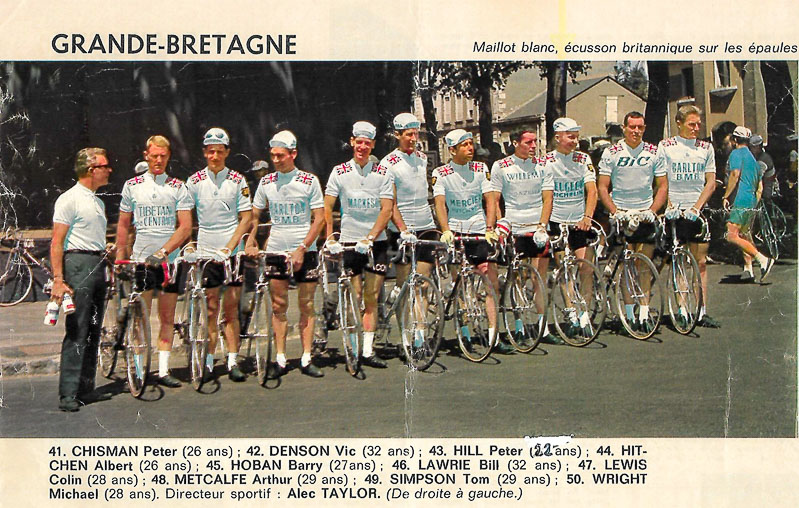
Second to Colin Lewis in the National in 1967, and a Tour de France ride.
“I turned professional and I realised my dream to participate in the Tour deFrance in 1967.
“Mr Boucher prepared me to start my professional season in January and I went to the training centre with Peugeot in the south of France in February.
“I did well in the first races but very quickly I realised I had to ride too many big Classic races in Belgium in my programme – with a lot of driving to get to each event by myself.
“I think it was badly organised and planned for a young rider; I rode all the Belgian Classics, Gand-Wevelgem, Tour des Flandres, Liège Bastogne Liège,Tour de Belgique and Paris-Roubaix.
“After that my directeur sportif at Peugeot told me it would be a good experienceto ride Tour d’Italie with Eddy Merckx. You can imagine that I was not properly prepared for Tour de France.
“Later at the end of season my directeur sportif thought it was a good idea for me to ride the Derny paced Bordeaux Paris. Usually this race is for riders at the end of their career!
“But Mr Boucher strictly recommended me not accept it, as it was too much!
“Unhappily, at the end of 1967 Peugeot did not continue to employ me although I had a contract for two years.”
One palmarès site also lists you as having ridden for Bob Jackson in ’67 and ’68?
“In 1968 – I tried to get back my amateur status from the BCF who did not accept my request and automatically sent me a professional licence.
“As it was too late to find a French sponsor I had to come back to England to continue to race.
“So I rode for Bob Jackson who gave me a small contract only in 1968.”
You won the Tour of North West Switzerland and criteriums in the UK in 1968 – tell us about that year.
“I got the opportunity through my London cycling friends with the Chris Barber team to ride the race in Switzerland.
“I thought it was a great idea for me to prepare the Tour de France. I was in very good conditions as I was not too worn out from having over-raced and had big ambitions for the Tour de France 1968.
“However, the BCF took me out of their ‘possible’ list for the Tour, their excuse being that I did not take part in the Tour de France selection races in England!
“From that moment onwards I was disillusioned and realised I couldn’t achieve the great ambitions I had in the sport.”
You’re listed with Chris Barber for 1969 but no results?
“That’s because I didn’t take out a licence in 1969; I got married that year – no bike.”
Why quit?
“I gave myself two years to be successful in the professional career and I found out and realised that many other things were necessary than sport to life.
“Circumstances were how they were – however I had realised my wish to participate in the Tour de France. It was my decision alone, and we never know if we are right or wrong.
“It might have been different if I got some support and had more financial means.
“Nowadays everything seems very different.”
You stayed in France – what did you do?
“I got married in 1969 and found an employment in an English factory inNormandie.
“I got my amateur licence back in 1970 and started again to win races and to continue to enjoy my cycling until we started to build our new house.”
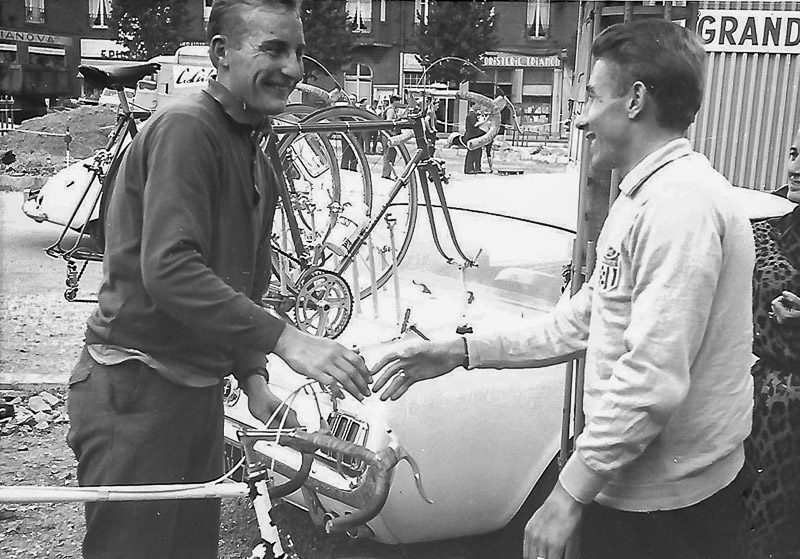
What do you rank as your ‘finest hour’ on the bike?
“My best moments are:
“Meeting Jacques Anquetil in Monsieur Boucher’s shop the first day I arrived in France; and later training with ‘Maitre Jaques’, especially to prepare for the Grand Prix des Nations which he won (that was in 1966).
“Winning the Grand Prix de France in Laval ( 12th Sept 1965).
“The Tour de l’Avenir in 1966 when I took the Yellow jersey.
“The Word Amateur Championship in Nürburgring, Germany – I was specially trained for this event by Mr Boucher and I think I had the potential to win but I met with mechanical troubles.
“And representing Great Britain in the Tour de France in 1967.”
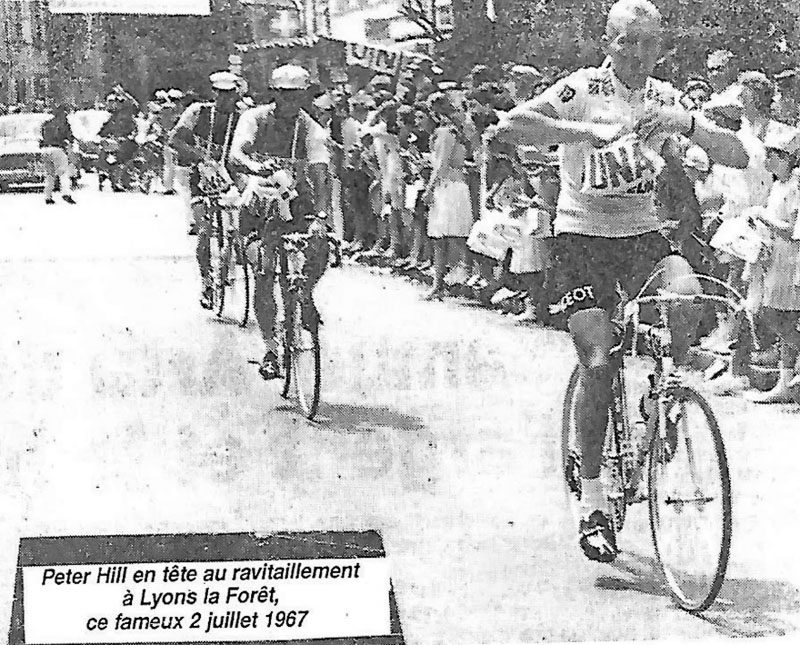
“If I had to do it again I would do the same even with all I know today.
“I retain a great admiration for Jacques Anquetil who still is a great champion for me.
“I would still come to France which is a very beautiful country.
“I have gained lots of experiences of life with cycling and also in my work, meeting a lot of different interesting people – and also have seen another part of the world.
“I also appreciate very much after so many years when I meet people in the street at home or anywhere else in France, who say ‘Hello’ and have a nice word with me.
“I believe in destiny and mine brings me lots of happiness.
“To grow from a small beginning and without the help of anyone I think I made something of myself.
“I’ve got two houses in two different, beautiful regions of France ( Normandie and Bretagne) and overall many satisfactions and sources of pride with my three wonderful sons who are all sportsmen – but not cyclists.
“They are perfect sons and exceptional persons in life.
“I love my way of life; I’m still cycling (about 6000 km each year), especially on mythical Mont Ventoux where I keep a thought for Tom when I pass in front of his memorial before reaching the summit.
“I can never thank my parents enough for giving me a lot of happiness when I was young and helping me so much to start cycling, letting me reach into the unknown and enjoy my own experiences – and never saying a negative word even when I decided to live permanently in France.”
